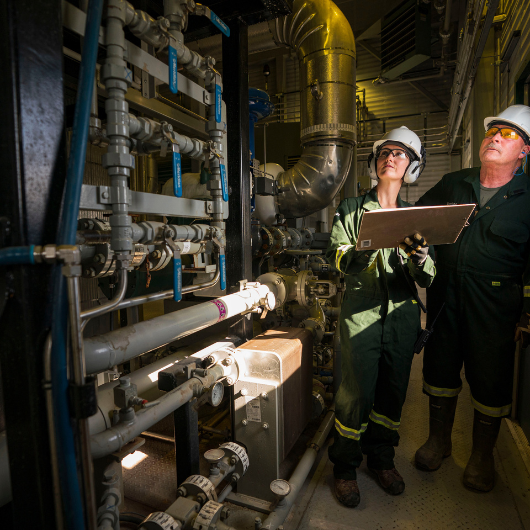Operator Training Program
Are you ready to dive into a dynamic and technically diverse career as a Power Engineer?

Woodfibre LNG, in collaboration with the Squamish Nation (Sḵwx̱wú7mesh Úxwumixw) Training and Trades Centre and the British Columbia Institute of Technology (BCIT), is implementing a comprehensive two-year Operator Training Program designed to provide hands-on experience, professional development, and a pathway to a fulfilling career. Upon completion of the program, trainees will attain Power Engineering certification and have the opportunity to join Woodfibre LNG as a Process Operator, a role that will play a pivotal part in ensuring the safe and reliable operation of our future LNG facility. Your contributions will be instrumental in maintaining the integrity of our processes, equipment, and the safety of our team.
What’s Included
The traineeship includes:
- Training allowance
- Tuition and study materials
- Meals
- Travel
After successfully completing the first year of the training program, participants will have earned their 4th Class Power Engineering Certificate and will receive an offer of full-time employment with Woodfibre LNG.
Entry Requirements
Woodfibre LNG is committed to giving priority to qualified members of the Squamish Nation first, then other Indigenous Nations. Applicants should have:
- A strong willingness to learn
- A desire to further your career
- The ability to work in a team
- Preparedness to work shift work
- Mechanical aptitude
Upon completion of the initial phase of the training program participants will need to fulfill entry requirements for the Power Engineering phase of the program at BCIT.
Program Structure
Operator Trainee Readiness Program (4-months)
Based out of the Squamish Nation Training and Trades Centre the first four months of the training program is focused on providing participants with the essential skills and knowledge to succeed as a Power Engineer. We will work with you to ensure you have the support and resources you need to be successful in passing the entry exam to proceed into the Power Engineering phase of the program conducted by BCIT.
Studies will include math, English, physics and chemistry designed to ensure successful completion of the entry exam for the Power Engineering program.
Power Engineering Phase (12-months)
Based out of the Squamish Nation Training and Trades Centre, plus 7 weeks of Power Lab at BCIT’s Burnaby campus, this phase of the program includes:
- An introduction to Woodfibre LNG Project
- 30-week Power Engineering Program
- Environmental Operators Certification Program
After successful completion of this phase participants will earn their 4th Class Power Engineering Certificate, qualifying them to work in a wide range of industries. You will be certified to monitor, troubleshoot, maintain, and operate pressurized processes that produce power for hospitals, schools, manufacturing, and facilities including pulp and paper mills, power generation plants, and oil and gas operations.
All graduates of the Power Engineering phase of the program will be offered a full-time role with Woodfibre LNG as a Trainee Operator.
Woodfibre LNG Specifics Phase (12-months)
The final year of the traineeship as a Trainee Operator will be focused on site and company specific training, including:
- LNG 101
- HSSE training
- Site awareness training modules
- Site systems training modules
- Emergency response procedures
- Firefighting and emergency response training
- Permit to work and lock-out tag-out
- Purging and isolations
- Fire and gas systems
- Confined space entry and gas testing of atmospheres
- Piping and instrument drawings and cause & effects training
After completing the final year of the Operator Training Program, Trainee Operators will be assigned an operations position on shift as a Process Operator and participate in the final commissioning and start-up of the Woodfibre LNG facility in Squamish.
About Process Operators
Process Operators are the backbone of our operations, overseeing the day-to-day activities that will keep our plant running smoothly.
Some of the key responsibilities include:
- Attend daily pre-start meetings
- Participate in HSSE site safety meetings
- Operate and monitor gas processing, utility, and safety systems
- Perform routine equipment inspections, arrange maintenance as needed
- Complete computerized work requests
- Prepare equipment for safe maintenance access
- Analyze samples and record data
- Manage the permit-to-work system for interactions with maintenance teams and contractors